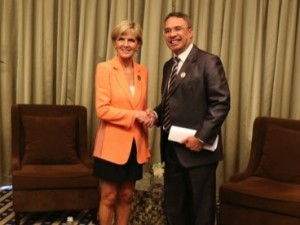Timor-Leste attends the Ministerial Conference of the Bali Process

The Minister of Foreign Affairs and Cooperation, Hernâni Coelho, attended the Ministerial Conference of the Bali Process on human trafficking and related transnational crime. This Sixth Session was held on March 22nd and 23rd, 2016, in Bali, Indonesia. Indonesia and Australia co-chaired the meeting, which aimed to find solutions to regional issues on human trafficking and to illegal migration challenges within the Asia Pacific region.
This process is different from other regional consultation processes. Following the principle of sharing efforts and collective responsibility, relevant international organizations can meet to share experiences and challenges that illegal migration countries of origin, transit and destination bring to other nations.
“The initiative to establish the Bali Process relates to human trafficking, illegal migration and several crimes, which can even be considered crimes against humanity, through processes of promotion and trade, violation of existing laws, particularly with regard to the movement of individuals from one country to another,” stated Minister Hernâni Coelho.
Minister Hernâni Coelho also explained that this is a forum for member countries, aimed at sharing experiences on how each country deals with these problems, how to establish mechanisms of cooperation to respond to human trafficking situations and other transnational crimes, and knowledge of the legislation in force in each country.
A statement, presenting the outcome of the discussions held in this sixth meeting, was drawn up. The Ministerial Statement also mentioned the commitment of member countries to establish effective and properly coordinated measures against illegal migration flows in the region. The participants have agreed to strengthen cooperation among all countries, whether they are countries of origin of persons who have fallen victim of human trafficking, transit or destination countries.
“Countries involved in any of these categories have a responsibility to work together with the remaining countries, to warn, to prevent or to respond when a situation like this arises,” stated Hernâni Coelho.
During the discussion, the idea of synchronizing the legislation of several countries to strengthen information among Member States also emerged. Thus, authorities may cooperate quickly, either detecting beforehand or responding to human trafficking situations. This is to ensure that if traffickers are identified, they will have to return to their country, willingly or not.
Over the next two years, these countries will work together to put this statement into practice. Thus, they will be able to improve the services system, to achieve an efficient and effective result.
267 people from 48 countries, including 17 Ministers, attended this conference. Five nations and six international organizations attended as observers. The news coverage was provided by 34 national and international journalists.










































